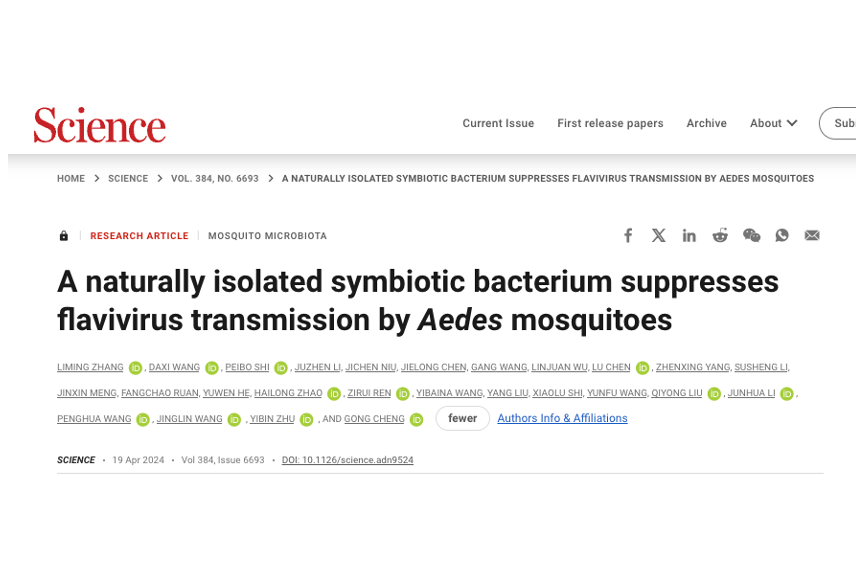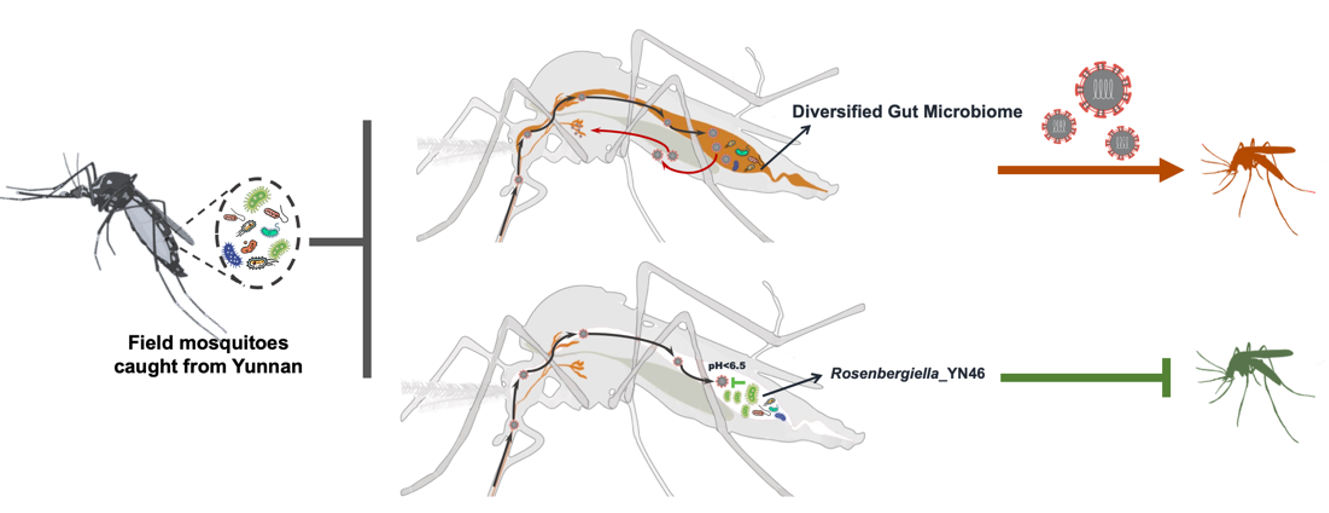On April 19, researchers from Tsinghua University, BGI-Research, the University of Connecticut Health Center, Kunming Medical University, the Chinese Center for Disease Control and Prevention and other institutes, made a significant breakthrough in controlling mosquito-borne diseases, which are a major public health threat worldwide. Published in the journal Science today, this pioneering study reveals the discovery and successful field trial of a key natural symbiotic bacterium named Rosenbergiella_YN46, found in Yunnan Province, China. This naturally isolated symbiotic bacterium can drastically reduce Aedes mosquitoes' susceptibility to viruses such as dengue and Zika.
 The study “A naturally isolated symbiotic bacterium suppresses flavivirus transmission by Aedes mosquitoes” was published in Science.
The study “A naturally isolated symbiotic bacterium suppresses flavivirus transmission by Aedes mosquitoes” was published in Science.
"This study not only reveals the complex interactions between mosquito gut microbiota and viral transmission but also provides a novel strategy for the prevention and control of mosquito-borne virus transmission," commented Dr. Daxi Wang, co-first author of the study and a researcher at BGI-Research.
Mosquito-borne viral diseases pose one of the most significant threats to human lives and health. Among them, dengue fever and Zika virus are particularly notorious. Dengue fever is prevalent in over 100 countries and infects up to 390 million people annually, leading to 500,000 hospitalizations and 20,000 deaths. Between 2015 and 2017, Zika virus severely affected the public health of the South and North America, as well as several Pacific islands. In Brazil, Zika virus infects an estimated 1.5 million people, with over 3,500 cases of infant microcephaly reported. In February 2016, the World Health Organization declared this Zika outbreak a Public Health Emergency of International Concern as evidence grew that Zika can cause birth defects and neurological problems.
To date, except for a few cases, no vaccine is available to protect against arboviral (viruses transmitted by insects) infections, calling for cost-effective and environmentally friendly strategies for mosquito-borne disease prevention.
The study found that Rosenbergiella_YN46 is highly effective in blocking the transmission of mosquito-borne flaviviruses, including dengue and Zika viruses. The bacterium secretes an enzyme called glucose dehydrogenase (RyGDH), which rapidly acidifies (pH≈6.0) and reshapes the microenvironment in the mosquito gut.
 Rosenbergiella_YN46 acidifies and reshapes the microenvironment in the mosquito gut which blocks the transmission of mosquito-borne flaviviruses.
Rosenbergiella_YN46 acidifies and reshapes the microenvironment in the mosquito gut which blocks the transmission of mosquito-borne flaviviruses.
Previous extensive research has shown that the envelope protein of mosquito-borne viruses, such as the dengue virus, is acid-sensitive. When viruses are placed in an acidic environment, their envelope proteins become unstable, leading to irreversible structural changes and loss of infectious capability. Therefore, the acidified gut environment directly inactivates any virus that enters the gut, thereby limiting the mosquito's ability to acquire viruses through blood feeding and significantly reducing the mosquito's susceptibility to the virus. This finding is confirmed in field experimental studies.
Bacteria of the Rosenbergiella genus widely exist in nature, with plant sap and nectar as environmental symbionts. Combining epidemiological survey records from the past decade, researchers undertook large-scale metatranscriptomic sequencing of Aedesmosquitoes across diverse regions in Yunnan. It was discovered that under similar climate conditions and mosquito population densities, Rosenbergiella_YN46 has a very high rate of colonization in the guts of mosquitoes from areas with low prevalence of dengue fever. In contrast, this bacterium exhibits a much lower colonization rate in mosquitoes' intestines from dengue-endemic regions.
This finding indicates a significant link between the natural distribution of Rosenbergiella_YN46 and the geographic spread of dengue fever throughout Yunnan. Such a link suggests that the presence or absence of Rosenbergiella_YN46 could potentially impact the local transmission of dengue fever, making it a fascinating subject for further examination and possible intervention strategies.
The research team conducted a series of field intervention experiments in Yunnan. By dispersing Rosenbergiella_YN46 into mosquito breeding waters, the scientists successfully colonized the bacterium in the insects' guts. This action significantly reduced the rates of dengue virus infections in the mosquitoes.
Furthermore, the study addresses the safety issues regarding the use of Rosenbergiella_YN46. The research team affirms that the symbiotic bond of the bacterium with mosquitoes has been stably existing in nature, which does not impact the mosquitoes' natural adaptability or pesticide resistance.
For the next step, researchers will explore suitable natural plant for sourcing this bacterium, with the hope to ultimately utilize the natural source to intervene the direct transmission of flavivirus from mosquitoes.
The research can be assessed here: https://doi.org/10.1126/science.adn9524
Source:
Hongkong Department of Health: Dengue Fever
https://www.chp.gov.hk/en/healthtopics/content/24/19.html
Journal of Infection and Public Health: Dengue overview: An updated systemic review
https://www.sciencedirect.com/science/article/pii/S1876034123002587#bib7
LSHTM: Brazilian babies born with Zika virus syndrome at greater risk of death in first three years of life than those born without



